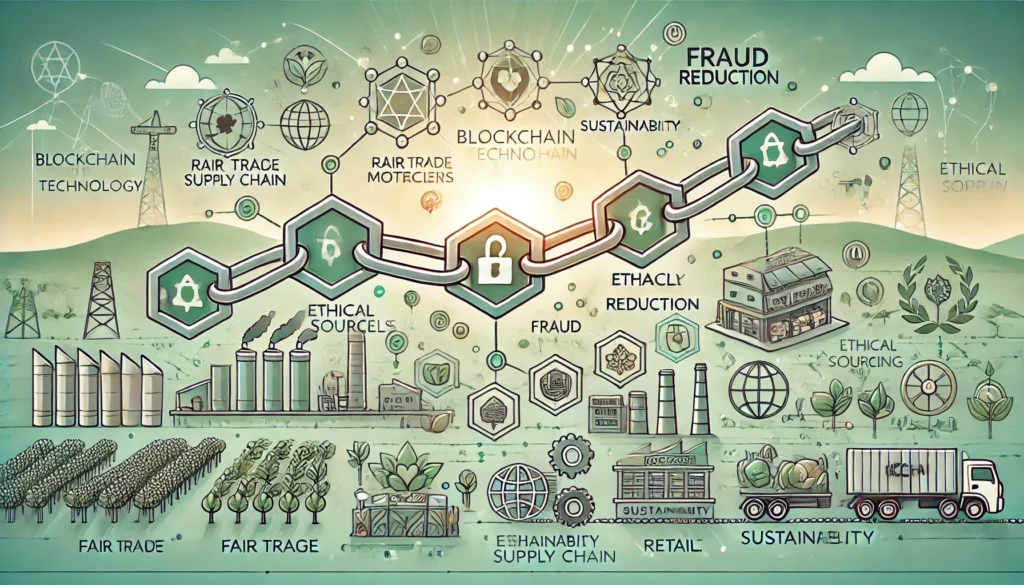In recent years, supply chain transparency has become a top priority for businesses and consumers alike. The growing demand for ethically sourced products, along with increasing concerns over fraud, environmental impact, and labor practices, has highlighted significant gaps in traditional supply chain systems. Blockchain technology, with its immutable, transparent, and decentralized nature, is emerging as a game-changing solution to address these issues. By leveraging blockchain, businesses can ensure ethical sourcing, reduce fraud, and build more resilient, transparent, and efficient supply chains.
This article explores how blockchain is transforming supply chain management, its role in ensuring ethical sourcing, and its potential in reducing fraud and improving overall supply chain integrity.
1. The Challenges of Traditional Supply Chains
Traditional supply chains are often characterized by a lack of transparency and traceability. These systems involve multiple intermediaries, and information is often siloed between various participants, including suppliers, manufacturers, distributors, and retailers. This lack of visibility can lead to several issues, such as:
- Ethical Sourcing Problems: Ensuring that materials are sourced ethically—free from exploitation, child labor, and environmental harm—can be difficult without a transparent and verifiable record of transactions.
- Fraud and Counterfeiting: Fake products or substandard goods entering the supply chain can result in major losses for companies and consumers.
- Inefficiency: Manual processes, paper-based records, and fragmented data systems increase the potential for errors, delays, and inefficiencies.
Blockchain offers a robust solution to these challenges by providing a secure, real-time, and transparent system for recording transactions and tracking goods from the point of origin to the end consumer.
2. Blockchain’s Role in Ethical Sourcing
2.1 Transparency and Traceability
Blockchain’s decentralized ledger allows every transaction to be recorded in an immutable, transparent way. As goods move through the supply chain, each step is logged on the blockchain, ensuring that all parties involved can verify the product’s journey.
For example, IBM’s Food Trust network enables food producers, suppliers, and consumers to trace the origin of a product, from farm to table. By scanning a QR code, consumers can instantly access details about how the food was grown, processed, and transported, helping them make informed purchasing decisions.
This transparency allows businesses to ensure that the raw materials they source are ethically obtained, and it provides consumers with confidence that the products they purchase align with their values, such as sustainability, fair trade, and responsible labor practices.
2.2 Provenance and Certifications
Blockchain can be used to verify certifications and provenance claims, such as organic, fair trade, or cruelty-free certifications. When a product is registered on the blockchain, it can carry verifiable information about its certification status, ensuring that claims made by producers are legitimate.
This is especially important in industries like fashion, where issues like sweatshop labor, environmental degradation, and animal cruelty are significant concerns. By embedding certification data on a blockchain, brands can provide verifiable proof of their ethical sourcing practices, giving consumers peace of mind that they are supporting responsible businesses.
3. Reducing Fraud and Counterfeiting with Blockchain
3.1 Product Authentication
One of the most significant advantages of blockchain in supply chains is its ability to prevent fraud and counterfeiting. Blockchain provides a secure and immutable record of ownership and transaction history for each product. Each product or shipment is registered as a unique digital asset on the blockchain, with a distinct identifier that cannot be altered or forged.
This feature is particularly beneficial in industries such as luxury goods, pharmaceuticals, and electronics, where counterfeiting can be a major issue. By using blockchain to authenticate products, companies can guarantee that their products are genuine, and consumers can verify that they are purchasing authentic items.
- Example: Everledger, a blockchain-based platform, is used to track diamonds and other high-value assets to ensure their authenticity, helping to eliminate conflict diamonds from the market and prevent fraud in the diamond supply chain.
3.2 Reducing Financial Fraud
Blockchain can also reduce the risk of financial fraud in supply chains. By providing real-time, tamper-proof records of all transactions, blockchain reduces the opportunity for falsified invoices, payments, or contracts to enter the system. Smart contracts—self-executing contracts that automatically execute transactions based on predefined conditions—can further streamline and secure the payment process, ensuring that funds are only released when agreed-upon conditions are met.
4. Improving Supply Chain Efficiency
4.1 Streamlining Processes
Blockchain technology can reduce the need for intermediaries and streamline supply chain processes, eliminating the inefficiencies of traditional systems. With blockchain, companies can instantly update inventory levels, track shipments, and monitor production progress, all on a secure, shared network.
Smart contracts also play a significant role in improving supply chain efficiency. For example, once the goods arrive at the designated location, the smart contract automatically triggers payment, which reduces delays and minimizes the chance of human error.
4.2 Real-Time Data Sharing
Blockchain allows all parties in the supply chain to share information in real time, which improves decision-making and response times. Supply chain stakeholders can instantly verify the status of shipments, track delays, and adjust schedules, making it easier to identify and resolve issues as they arise.
5. Real-World Examples of Blockchain in Supply Chains
Several companies have already embraced blockchain to improve transparency, reduce fraud, and ensure ethical sourcing:
- Walmart and IBM: Walmart uses the IBM Food Trust platform to trace the origin of food products, ensuring that they are ethically sourced and safe for consumers. The blockchain-based system allows Walmart to trace the journey of a package of mangoes from the farm to the store in seconds, reducing the time it takes to identify and address potential contamination issues.
- De Beers and Everledger: De Beers, the global diamond company, uses Everledger’s blockchain platform to track the provenance of diamonds and prevent the sale of conflict diamonds. This ensures that consumers can be certain that their diamonds have been ethically sourced.
- Provenance: This blockchain-based platform enables businesses to showcase the story behind their products, providing transparency about sourcing, production, and environmental impact.
6. Challenges and the Road Ahead
While blockchain has the potential to transform supply chain management, there are still challenges to overcome:
- Scalability: The volume of transactions in large global supply chains can be enormous, and blockchain networks must be able to handle high transaction volumes efficiently.
- Integration with Existing Systems: Many companies still use legacy systems, and integrating blockchain with existing infrastructure can be a complex and costly process.
- Regulatory and Legal Issues: There is still uncertainty around the regulation of blockchain in supply chains, especially in industries with stringent requirements, such as food safety or pharmaceuticals.
Despite these challenges, blockchain’s ability to enhance transparency, reduce fraud, and ensure ethical sourcing presents an exciting opportunity for the future of supply chain management. As blockchain technology matures and adoption grows, it will likely become an integral part of creating more sustainable, ethical, and efficient global supply chains.
Conclusion
Blockchain technology offers a powerful solution to the ongoing challenges of ensuring ethical sourcing, preventing fraud, and enhancing transparency in global supply chains. By providing a secure, immutable, and transparent record of transactions, blockchain enables businesses to build trust with consumers, optimize operations, and promote responsible sourcing practices.
As blockchain adoption grows across industries, it will reshape the way companies manage their supply chains, making them more transparent, ethical, and resilient. By embracing this technology, businesses can help create a future where supply chains are not only more efficient but also more aligned with the values of sustainability and corporate social responsibility.


